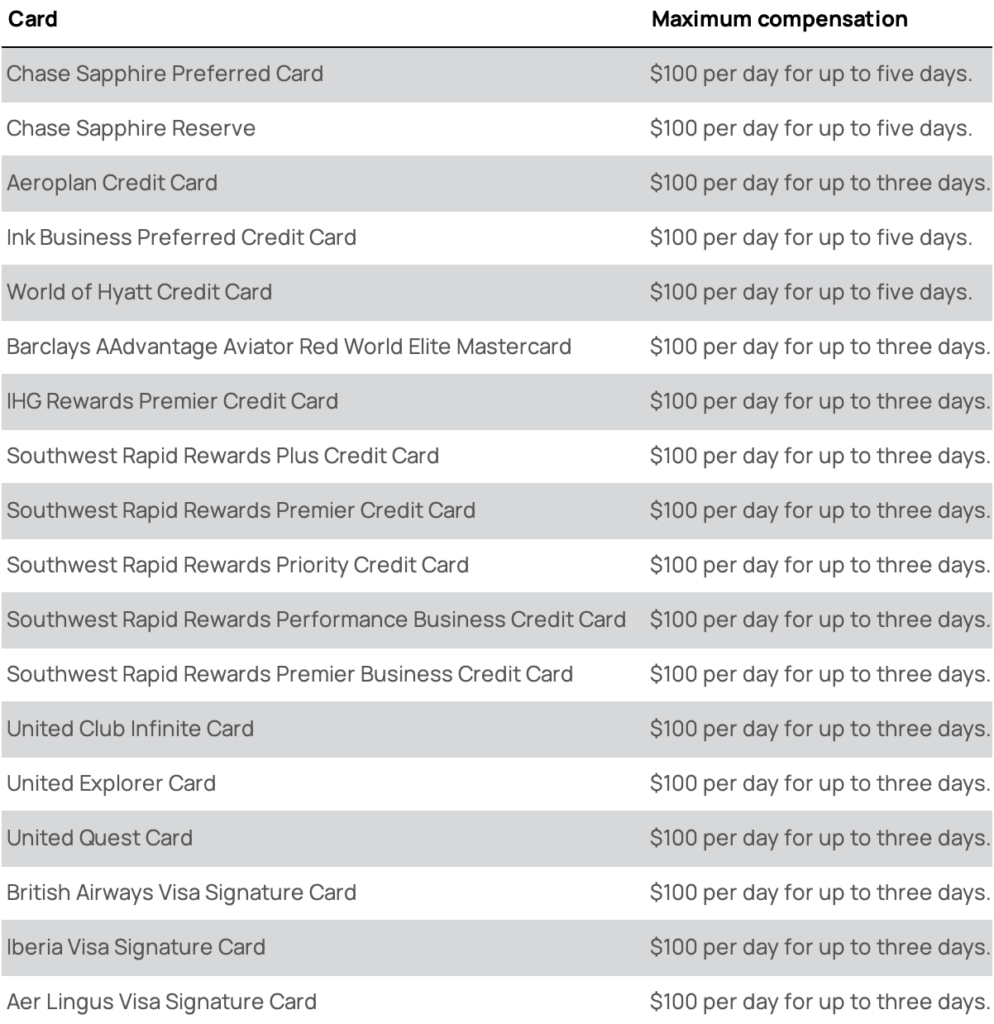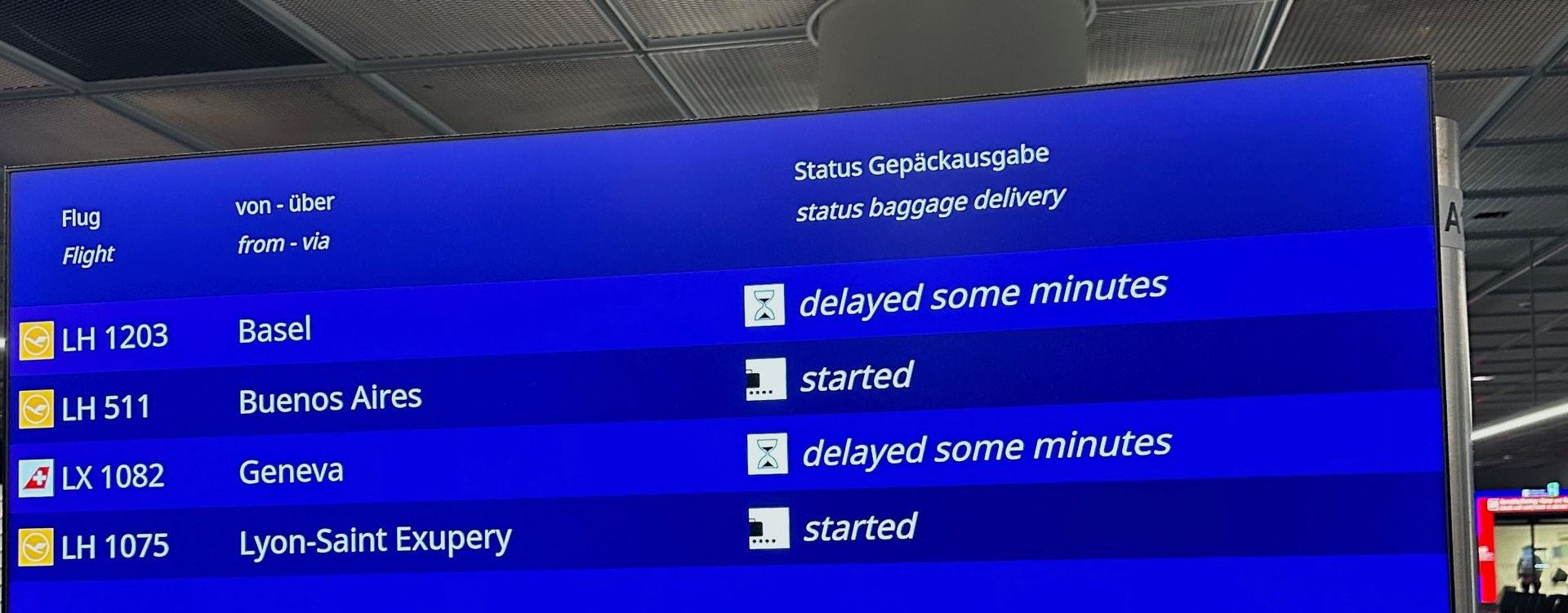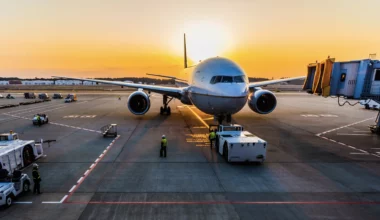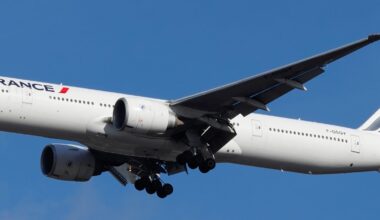As an American living in Germany, I’ve often found it challenging to make sense of the different rules and regulations surrounding air travel in Europe, especially when things go wrong. Since I was recently on a SWISS flight in which my bag, along with every checked bag on the flight, was temporarily lost, I’m going to outline here the best course of action to take if your bags are lost or delayed that will result in a) the quickest return of your bags and b) the most compensation. Obviously, nothing is guaranteed but, in my experience, these steps maximize the probability of a positive outcome.
Submit a claim
The moment you discover your bag isn’t coming out at baggage claim, you should submit a delayed baggage claim. You can do this at the airport or online. Generally, it’s quicker to do it online (depending on the line at the baggage desk) and equally effective. Whichever way you choose to submit a claim, keep in mind that, generally, the faster you do it the higher up in line you’ll be to receive your bags when they’re found, so be quick.
Generally, you’ll be required to include the following information when making a claim:
- Your booking reference of your flight
- Your Baggage Tag Number, generally shown on any receipts given or emailed to you when you checked in
- Your contact details for the airline to contact you when tracking down your bag
- A delivery address to which you want your bag delivered
When your report has been submitted, you’ll receive an email with a Bag Tracing Number and information about next steps. When your bag has been traced you’ll receive a text and/or to let you know when it will be delivered to you.
Here’s a list of links to all major European airlines’ online claims forms:
- Lufthansa
- SWISS
- Austrian
- Air France
- KLM
- Turkish
- SAS
- easyJet
- British Airways
- Vueling
- Iberia
- Aer Lingus
- Finnair
- TAP Air Portugal
- Pegasus
- Ryanair
Annoyingly, some airlines require passengers to make lost baggage claims at the airport. If this is the case, find an employee in the baggage claim area and ask for assistance. Here’s a list of those airlines:
- Air Europa
- Wizz Air
- Norwegian Air
- Ryanair
Finally, keep in mind that Ryanair is the only airline listed above that requires passengers to both report their lost baggage at the airport and submit a separate online claim.
Track the bag
Once you’ve submitted a delayed bag claim, you’ll be able to get updates on your bag using a reference number (sometimes called a PIR number) and your last name. Every major European airline has an online portal where you can do this, even the ones that don’t allow you to make an initial claim online.
Here’s a list of links to each airline’s online baggage tracking portal:
- Lufthansa
- SWISS
- Austrian
- Air France
- KLM
- Turkish
- SAS
- easyJet
- British Airways
- Vueling
- Iberia
- Aer Lingus
- Finnair
- TAP Air Portugal
- Pegasus
- Air Europa
- Ryanair
- Wizz Air
- Norwegian Air
Don’t worry about compulsively checking these portals. It’ll drive you even crazier and, in any case, if there’s an important update (e.g. your bag is located or scheduled for delivery) you’ll be emailed and/or texted.
Email airline executives
Once you’ve submitted a delayed baggage claim, it’s time to email executives at the airline you’re dealing with. I do this for two reasons. First (and more anecdotally), it seems to speed up the process of the airline finding my bag. Second, the airline will often assign a high-level customer service rep to your case. This second part is extremely useful because it usually means a few things:
- There’s a competent employee who’s now accountable for the outcome of your bag
- You have someone to whom you can direct questions/concerns rather than an online form that often goes unanswered
- Most importantly, you can submit requests for compensation and receipts to a competent employee, which is generally much quicker and easier than using an online claim form. On top of this, I’ve often found that these employees have the power to unilaterally grant substantially more compensation than is outlined by an airline’s official guidelines.
Finding executive emails is generally pretty easy. The Elliott Report, a site run by a nonprofit consumer advocacy organization, is my go-to for executive contacts. Just click on this link and find your airline on their list. To maximize your chances of a response, I recommend addressing your email to every address you can find (Elliott typically has 2-5 for each airline), because you’ll often find an email that is no longer active.
In your email, politely describe the situation as clearly and professionally as possible. Be sure to include the following information in your email:
- Your full name
- Flight number
- Flight date
- Delayed bag reference number
In my experience, if an email is sent during the workweek, you can typically expect a response within 24 hours.
Use Twitter
If all the measures above are taken, I haven’t found tweeting publicly at the airline to be particularly effective at speeding up baggage recovery or receiving compensation, though I’m sure that someone with far more followers than I might enjoy better results. I usually use Twitter if I haven’t received a response to my executive email within 24 hours. If you do choose to tweet publicly at the airline, describe the situation clearly and include the airline’s Twitter handle, as well as your flight number and date. Don’t include your bag reference; the airline will usually DM you and ask for it along with any other necessary information.
I also find DM’ing the airline generally ineffective–it usually results in them responding with information you could just as easily find on an online baggage tracking portal.
Airline compensation
Though the European Union’s EU261 ruling enshrined great protections in the case your flight is canceled or delayed, its consumer protections for delayed and lost baggage is not nearly as good. Unlike for delayed or canceled flights, EU261 does not spell out a specific dollar amount that airlines must compensate passengers for lost or delayed baggage, instead vaguely stipulating that airlines should reimburse any necessary expenses as a result of the delayed bags. That means that it’s up to each airline to decide what “essential” means, how much they’re willing to pay, and for how long a bag needs to be missing before they’ll compensate a passenger.
One positive side of the vagueness is that airlines’ delayed bag policies are often quite flexible. For example, when my bags were delayed while flying SWISS a few weeks ago, I was compensated over $400 for clothes I purchased as a result, even though the published guidelines stipulate that SWISS will only compensate up to $100 for economy class passengers.
Credit card compensation
If you booked your flight with certain credit cards, you’ll be able to get additional compensation. Keep this list in mind when you’re booking your next flight; even certain premium credit cards like the American Express Platinum don’t cover delayed bags. Also, keep in mind that the compensation provided by these cards only kicks in after a six-hour delay, with the exception of the Barclays AAdvantage Aviator Red World Elite Mastercard, which kicks in after four hours.

Preemptive measures for next time
If your bag is already delayed, the steps I outlined above are the best way I’ve found to deal with the situation. In the future, there are two things I’m going to make sure to do before my flight to make dealing with a delayed bag even easier.
1. Put an Apple AirTag in my suitcase
This helps you know for sure where your bag is, even before you take off. You’ll know whether or not your bags are in the hold of the plane you’re on and, if they’re not, you won’t have to wait at baggage claim for hours to figure it out, allowing you to file a claim quicker and get your bags back sooner.
2. Make sure to pay for the flight with my Chase Sapphire Preferred card.
Though I typically book flights on my American Express Platinum Card in order to get five points per dollar spent, I’m going to book using my Chase Sapphire Preferred card anytime I plan to check a bag because the card generously reimburses up to $500 for delayed baggage on top of whatever the airline compensates you. I already have a Chase Sapphire Preferred card, but you can use any of the cards in the table above.
Conclusion
Dealing with a delayed bag sucks, but the list of steps above helps me navigate the situation while minimizing stress and maximizing compensation.






